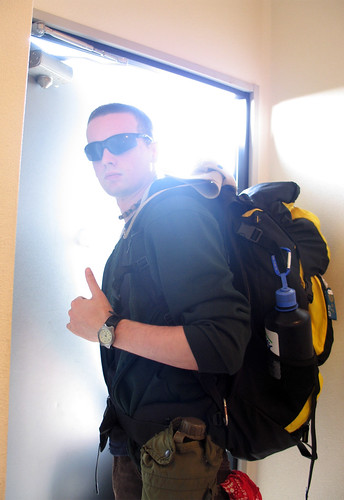April 21, 2006
April 19, 2006
Bang On!
Things've been busy lately. The new academic year started about two weeks ago and classes are now getting up to speed at all my new schools: two middle schools, one elementary, and one small school out in the hills that combines both in one complex. I haven't formed any really solid impressions yet as most of my experience thus far has been the obligatory じこうしょうかい (self-introduction) lesson. Let me tell you, any interest you thought you could wring out of your life tends to look decidedly less so after the seventh or eighth iteration. Also, my answer of "none" to the inevitable "What sports do you play?" question continues to kill me with the middle school boys. My friend Joe suggests just lying, but based on my performance on the field today when I joined some of the seventh grade boys at soccer during recess, I doubt I'd be fooling anyone.
Of course, I'm waving good-bye just about as soon as I say hello, because I leave for Bangladesh this Saturday with a group of about a dozen other Saga JETs for a Habitat for Humanity Global Village trip. Volunteering of this kind isn't common practice in Japan — see the previous note about civic participation — but as part of our efforts to raise funds a couple of us got in the local paper, which means pretty much everyone here knows about us going and for the most part is very impressed that we are. Not so impressed that they volunteer to donate some money towards our trip, but, y'know, it's the thought that counts.
This will be my first visit to a country outside the developed world, my first visit to South Asia, and my first Habitat build outside the United States. It will also be the first Habitat trip I've gone on in about four years where I wasn't taking a leading role. I'm not really sure what to expect, but I think it'll be an interesting experience. Our first week will be devoted to building, and will include a home-stay and visit to a local school; then we have several days to travel on our own. I'll probably be taking a river tour through the world's largest mangrove forest, the Sundarbans. Wikipedia promises man-eating tigers, although apparently the group that visited Bangladesh last year didn't run into any. I've got my malaria meds and shaved my head down to the shortest it's been since about two years old — not, uh, entirely on purpose, but oh well — and all the other travel necessities pretty well squared away, so all that's left is to debate with myself whether to invest in this baby before I depart or to stick with my trusty, albeit poorly-endowed-in-the-zoom-lens-department Canon G6. Either way I should return with plenty of pictures, stories, and hopefully no intestinal parasites.
Your server has been
MC Master Chef
at
6:23 AM
1 tips
![]()
key ingredients: Bangladesh, JET, travel
April 08, 2006
Kyushu Cup
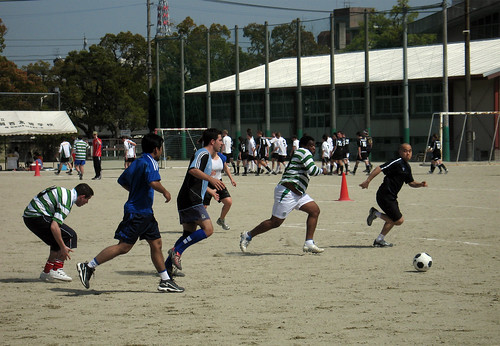
The largest concentration of ALTs in the prefecture here is in the capital, Saga City — a number of them actually live together in a big apartment block, which I'm sure makes for a much different experience than what I get up here in comparatively remote Karatsu. I don't think I really envy them — college dorm life wasn't an experience I look back upon with any especially fond memories — but for better or worse they do seem to have a much tighter-knit community than Karatsu does.
Thus events like the 2006 Kyushu Cup, a tourney of ALT amateur soccer teams from across the island (and one group from the tail-end of Honshu, Yamaguchi-ken) that Saga had the privelege of hosting this weekend. Of course, this was not amateur as in "anybody who'd like to get out and have some fun kicking the ball around" amateur, but rather more like "expat sports players from around the world, unite!" amateur, so I was there strictly as a specator (and vendor of snacks for Habitat for Humanity fundraising). It was also an occassion for an attempt at some sports photography, although I'm afraid my meager zoom lens capability prevented me from capturing anything too dramatic, like, say, a goal. This is maybe just as well, considering Saga's home-turf advantage proved insufficient to forestall the onslaught from champions Fukuoka-ken, resulting in a somewhat dispiriting fourth-place finish. Oh well — as the Japanese say, otsukaresamadeshita, everybody!
April 04, 2006
Hanami
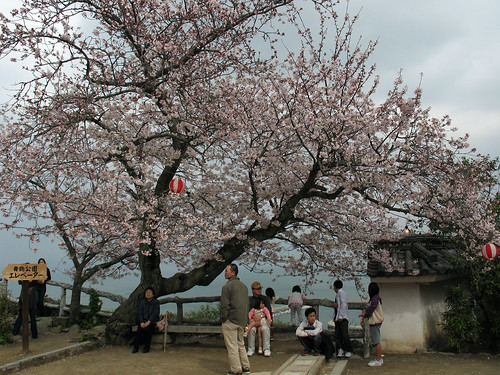
A group of us ALTs took a trip to the nearby Nagoya Castle ruins in Chinzei (from which Hideyoshi launched his invasion of Korea, way back when) at the start of the month to view the flowers, but it was overcast the whole day and I didn't get many good pictures out of it. This is from a short solo visit to Karatsu Castle the other day, where I ran into some students and many groups of Japanese out picnicking, drinking, and taking in the sakura blossoms.
April 01, 2006
Planned Obsolecence: Not Just For ALTs Anymore
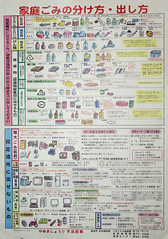 Japan is famously neurotic when it comes to sorting trash. You can certainly see why they might be picky about it — large landfills are hardly viable in a country this small and mountainous, so sorting out burnable or recyclable trash is going to be a necessity if you want to keep from being buried in a landscape of discarded Gundam figures and CC Lemon bottles. "Oh, isn't Japan such a clean country?" people back home sometimes remark. It's probably true that the bigger cities have a certain futuristic concrete-and-glass sterility to them — certainly compared to the couple of big European capitals I've visited (my most vivid memory of Paris back in 1995 will probably be the trash cans, lids sealed shut with trash piled atop everywhere you went, on account of Algerian elections-related-bombing fears) But unfortunately out here in Saga, one of nation's smallest and poorest prefectures, the recycling ideal set forth in the legal codes is not always exactly matched in practice. I sometimes get the sense that environmentalism here is often imbibed but not really 'digested' — it's there in the official slogans, but not as much embraced at the popular, individual level. It may not be a case of people not caring so much as a relatively weak tradition of civic participation in Japan, where people expect the bureaucracy to handle these matters (I think I see similar attitudes in regards to Japanese education, poverty, and housing standards, among others). Whether that's the case or not, I can say with fair certainty that 'clean' is not the first word I would use to describe the state of the Japanese environment today.
Japan is famously neurotic when it comes to sorting trash. You can certainly see why they might be picky about it — large landfills are hardly viable in a country this small and mountainous, so sorting out burnable or recyclable trash is going to be a necessity if you want to keep from being buried in a landscape of discarded Gundam figures and CC Lemon bottles. "Oh, isn't Japan such a clean country?" people back home sometimes remark. It's probably true that the bigger cities have a certain futuristic concrete-and-glass sterility to them — certainly compared to the couple of big European capitals I've visited (my most vivid memory of Paris back in 1995 will probably be the trash cans, lids sealed shut with trash piled atop everywhere you went, on account of Algerian elections-related-bombing fears) But unfortunately out here in Saga, one of nation's smallest and poorest prefectures, the recycling ideal set forth in the legal codes is not always exactly matched in practice. I sometimes get the sense that environmentalism here is often imbibed but not really 'digested' — it's there in the official slogans, but not as much embraced at the popular, individual level. It may not be a case of people not caring so much as a relatively weak tradition of civic participation in Japan, where people expect the bureaucracy to handle these matters (I think I see similar attitudes in regards to Japanese education, poverty, and housing standards, among others). Whether that's the case or not, I can say with fair certainty that 'clean' is not the first word I would use to describe the state of the Japanese environment today.
For one thing, many key pieces of infrastructure are displaying serious signs of age — I doubt if any of my school buildings are younger than twenty years old at best, and one of them I know to be over fifty. Insulation is but a distant memory (even in a lot of newer homes and apartments) and central heating, while found in the city hall and all the convenience stores in town, is not to be had in any of Karatsu's various halls of learning. (Of course, the kids are allowed to bundle up over their uniforms during the winter when all that air from Siberia descends down upon us, right? *Hollow laugh.*) I've even made a hobby of exploring ruined buildings in the area, products of a decade-long recession and the ongoing emptying of the countryside as the diminishing population concetrates increasingly closer to the larger urban centers.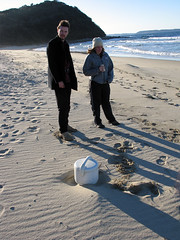 More directly related to the trash issue is the fact that, given the choice between complicated, expensive sorting of one's refuse and a quick drive out into the countryside, it's not really especially surprising that many people opt for illegal dumping. While I shouldn't make sweeping generalizations about the whole country, I do know this isn't limited to Karatsu or its rural surroundings: I remember hiking along a road through the hills of Kyoto on a visit to my girlfriend in college once and passing refrigerators, microwaves, even a car, all chucked off the side of the road. Nor is it just the larger items: Karatsu's beaches, river and canals are regularly littered with trash of all varieties. Of course, not everyone dumps: those with the space just pile it up on their porch or in their yard. My neighbor for one has four refrigerators piled up under his awning, among other items, which would probably run about $45 a piece, were he or she to pay the disposal fees. Not surprisingly, ALT apartments tend to become crammed full of junk, as their continuously revolving roster of occupants pass their old and abandoned possessions onto their successors rather than pay for their disposal.
More directly related to the trash issue is the fact that, given the choice between complicated, expensive sorting of one's refuse and a quick drive out into the countryside, it's not really especially surprising that many people opt for illegal dumping. While I shouldn't make sweeping generalizations about the whole country, I do know this isn't limited to Karatsu or its rural surroundings: I remember hiking along a road through the hills of Kyoto on a visit to my girlfriend in college once and passing refrigerators, microwaves, even a car, all chucked off the side of the road. Nor is it just the larger items: Karatsu's beaches, river and canals are regularly littered with trash of all varieties. Of course, not everyone dumps: those with the space just pile it up on their porch or in their yard. My neighbor for one has four refrigerators piled up under his awning, among other items, which would probably run about $45 a piece, were he or she to pay the disposal fees. Not surprisingly, ALT apartments tend to become crammed full of junk, as their continuously revolving roster of occupants pass their old and abandoned possessions onto their successors rather than pay for their disposal.
Now while this is all problematic — and I don't want to pretend the problem is unique to Japan, as you're liable to see the exact same sights out along the rural roads of South-Central Indiana — there is also the compounding factor that the Japanese people, frankly, buy a lot of junk. That junk in turn is consistently over-packaged: you have to be swift at the konbini if you want to forestall the near-automatic wrapping of your purchase, no matter how tiny it may be, in some sort of plastic bag. (Even then, some sort of universal convenience store code requires your sales clerk to affix a little sticker with the name of the store on it, just in case your delicious onigiri be mistaken for a competitor's, I guess.) Personal electronics — cell phones, DVD players, game systems, et cetera (although not as much personal computers, from what I've seen) as you might expect, are ubiquitous, even among families living in houses that I would normally be volunteering to tear down and build anew with Habitat were I back in the states. Used cars tend to be extremely cheap in Japan, because hardly anyone buys them, preferring the newer models. Basically, it seems as though, in the process of developing post-WW II on the strength of American consumption, Japan adopted the consumer society ethos to an even greater degree.
I think a lot of JETs living here in Japan tend to write off the strange or unusual practices of the Japanese (and since familiarity with Japan or Japanese is not a requirement for employment with JET, there is rarely a shortage of these to react to) as being just a matter of "the way they do things here" or "who the Japanese are"; in this they are not infrequently aided by Japanese people who would like to assert their nation's cultural distinctiveness. In matters such as this one, I think this attitude often overlooks the degree to which the Japanese state bureaucracy's regulatory decisions — whether consciously or not — have contributed to certain behaviors and disincentivized others. Charge high inspection fees for cars as they advance in age: people buy a new one every few years. Institute complicated, expensive trash disposal procedures: people dump their fridges in the woods or stack them up next to their house for years.
Require $2000 tests for old electronics items in the name of avoiding electric fires, while allowing an exception for their export, and you'll drive domestic second-hand retail shops out of business and their products either 1) into the junkyard or 2) into the export market — and, incidently, force Japanese consumers to pay for newer models instead. For a country that built its post-war recovery on the strength of a protectionist export-led growth model, this doesn't come as all that surprising of a move — although in this case it appears as though there is some confusion as to what will now be exempt from the law, as the ministries backtrack in the face of a big public outburst against it. If it does in fact go through, however, I imagine we can expect to see even more televisions and VCRs out there along the roadside in the years to come.
Your server has been
MC Master Chef
at
6:32 AM
5
tips
![]()
key ingredients: environment, garbage, Japan, JET, recycling, regulation
